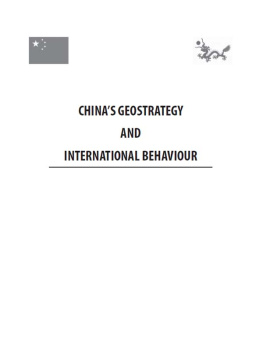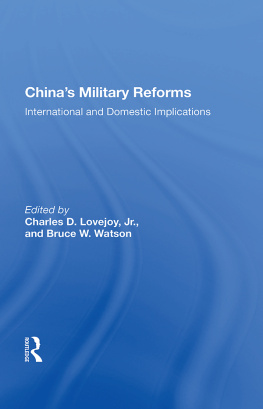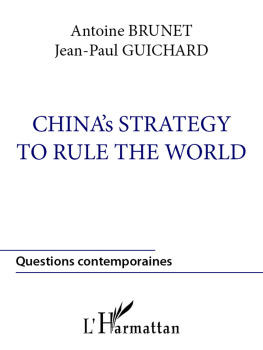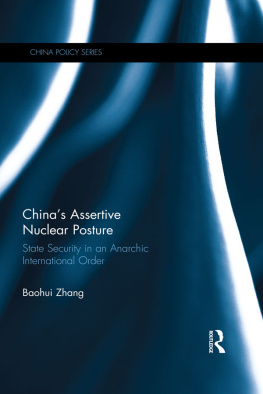Published by
Vij Books India Pvt Ltd
(Publishers, Distributors & Importers)
2/19, Ansari Road
Delhi 110 002
Phones: 91-11-43596460, 91-11-47340674
Fax: 91-11-47340674
e-mail:
Copyright 2014, United Service Institution of India, New Delhi
ISBN: 978-9-382-65255-7
Price in India:

795/-
All rights reserved.
No part of this book may be reproduced, stored in a retrieval system, transmitted or utilized in any Form or by any means, electronic, mechanical, photocopying, recording or otherwise, without the prior permission of the copyright owner. Application For such permission should be addressed to the publisher.
The views expressed in the book are of the author and not necessarily those of the USI or publishers.
FOREWORD
The role of Geography, history and politics in formulating National Strategy is undeniable. As regions strive to maximise their natural advantages while mitigating their limitations they establish precedents which become historic milestones for predicting their future actions. These acquire greater importance when we consider that geography changes little with time.
China too is similarly defined by significant geographical advantages and limitations. The fact that it is protected by natural barriers in the East, South and West; that large distances are an accepted fact in the third largest country of the world; that despite being the third largest country in terms of land mass it has just one-third the arable land per person compared to the rest of the world; that the arable land is concentrated in the east of the country populated essentially by the Hans; that its sea access is limited by a virtual wall of islands which can be used to choke it; that it always had one of the largest and presently has the largest population of the world to feed; have all had a defining influence on China. Historically thus the Chinese system of governance based on the rulers Mandate of Heaven was indicative of their endeavour for social stability and order which was characterised by tight centralised control and a strong bureaucracy. Endeavours to transfer prosperity from one area to another and an open / shut dynamic with respect to the outside world have again been evident as recurrent themes in the Chinese history. Chinese historical behaviour is also indicative of their endeavour in maintaining buffer zones along its borders and a demographic invasion of these frontiers. To many these would seem as an apt description of the present Communist regime, it is no surprise then that many believe the present regime is yet another dynasty in the evolving Chinese history.
The Chinese government today is facing the same dilemmas that had historically dogged the previous regimes. Faced with disparate development and rising inequalities amongst the population, the Chinese development model is being questioned both by scholars, critics outside and to some extent by its people. Keeping internal strife at bay requires transfer of prosperity; the latter in turn requires sustained creation of wealth, which in turn is dependent upon access to international markets and access to the sea. It is no surprise then that the Chinese have included strategic resources, trade routes and sea access as part of issues on which they would accept no compromises. Internal stability issues are raising their head in the historic buffer zones of Xinjiang and Tibet. Territorial integrity therefore forms an important component of the Chinese Core Interests concept. The Chinese use both the carrot and stick method to control and manage this. Hence, alongside the promise of prosperity use of the Armed/ Security Forces and demographic integration (what many term as invasion which is being resisted by the locals) are increasingly visible. Calls for maintaining the partys control over the Armed Forces and voices which believe that depoliticized Armed Forces were a historical blunder which led to the collapse of the Soviet Union and Warsaw Pact are also becoming louder. This in turn permits the Armed Forces to position themselves as the final arbitrators of regime preservation. Their exalted pre-eminence is visible in the Chinese foreign policy and are lending a degree of assertiveness to it. What is becoming an issue of concern to the international community is that the aggressiveness is being supported by other tools of the government-administrative, policy support, economic etc in what the Chinese call the combination punches.
This aggressiveness is not limited to their periphery alone. The Chinese pursuit of resources to fuel its emergence as an economic power places it in conflict with both the international powers and often with local regimes. Many critics and even some allies have been warning of the Chinese demographic invasion in its wake. This pursuit has led to a reorientation of the Chinese Foreign Policy as Deng Xiaopings dictum of, hide your strength, bide your time is being challenged and is in the process of being shelved. In turn this implies possibilities of Chinese involvement in the internal affairs of other states.
In all this, China itself is changing. China of this day is a far cry from the Communist regime established by Mao. The process initiated by Deng Xiaoping (through the 3rd Plenary Session of the 11th Central Committee of the Communist Party of China from 18 to 22 Dec 1978) has made China an economic giant which many believe is Communist only in name. Even while the Third Plenum of November 2013 seeks to strengthen the process, it has also recognized vulnerabilities in the society, which many believe have the potential of resulting in an internal collapse. In such an environment, Chinas ability to implement in letter and spirit, the 60 odd decisions that it had announced needs to be watched carefully. Also, the spiral effect of their implementation needs to be guarded against as they have the potential to de-stabilize the region. For example, even as China has been making efforts to export labour to ensure employment for its burgeoning population, its decision to conditionally lift the restriction on more than one child, would have implications for the next generation. Similarly, even while it seeks to restrain political dissent through restrictions on social media, its decision to dissolve the system of labour camps, one of its main tools to rein in dissent, appears to be countering the first. Does this indicate a renewed political confidence or decisions taken under social pressure? More contentious decisions like residency reforms, increased role for the markets and reforming the State Owned Enterprises are likely to challenge the entrenched interests and put pressure on the central leadership. Would a leadership under pressure domestically, become more assertive in its external relations, as some believe? Answers to these and other questions require to be sought through an understanding of their aspirations and behaviour.
This book is an important and valuable contribution as it attempts to understand the geographical and historical dimensions of the Chinese strategic problems and the solutions they have historically applied, to overcome these. What emerges, are patterns of behaviour, which are indicative of the Chinese geo-strategy, which are validated with the Chinese behaviour in the recent past. The patterns which thus emerge are important pointers and lessons in managing a relationship with China.
I am delighted to congratulate Col Akshaya Handa for his timely work of immense value to the geo-strategic community and to the USI of India, New Delhi for their support and encouragement to the author.

 795/-
795/-








